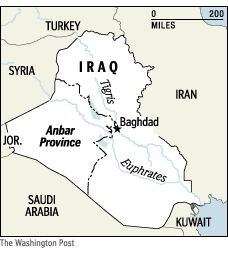 A classified assessment of the security situation in the Anbar province paints a very pessimistic picture. According to the report local governments have collapsed, the central government has little presence and the United States armed forces do not have the troops to spare beyond those already in the region. The danger is leaving a vacuum that to be filled by the insurgent group al-Qaeda in Iraq.
A classified assessment of the security situation in the Anbar province paints a very pessimistic picture. According to the report local governments have collapsed, the central government has little presence and the United States armed forces do not have the troops to spare beyond those already in the region. The danger is leaving a vacuum that to be filled by the insurgent group al-Qaeda in Iraq.According to the Washington Post story by Tom Ricks in today’s paper,
The officials described Col. Pete Devlin's classified assessment of the
dire state of Anbar as the first time that a senior U.S. military officer has
filed so negative a report from Iraq.
One Army officer summarized it as arguing that in Anbar province,
"We haven't been defeated militarily but we have been defeated politically --
and that's where wars are won and lost."
The "very pessimistic" statement, as one Marine officer called it,
was dated Aug. 16 and sent to Washington shortly after that, and has been
discussed across the Pentagon and elsewhere in national security circles. "I
don't know if it is a shock wave, but it's made people uncomfortable," said a
Defense Department official who has read the report. Like others interviewed
about the report, he spoke on the condition that he not be identified by name
because of the document's sensitivity.
Devlin reports that there are no functioning Iraqi government
institutions in Anbar, leaving a vacuum that has been filled by the insurgent
group al-Qaeda in Iraq, which has become the province's most significant
political force, said the Army officer, who has read the report. Another person
familiar with the report said it describes Anbar as beyond repair; a third said
it concludes that the United States has lost in Anbar.
Devlin offers a series of reasons for the situation, including a
lack of U.S. and Iraqi troops, a problem that has dogged commanders since the
fall of Baghdad more than three years ago, said people who have read it. These
people said he reported that not only are military operations facing a
stalemate, unable to extend and sustain security beyond the perimeters of their
bases, but also local governments in the province have collapsed and the weak
central government has almost no presence.
****
Anbar is a key province; it encompasses Ramadi and
Fallujah, which with Baghdad pose the greatest challenge U.S. forces have faced
in Iraq. It accounts for 30 percent of Iraq's land mass, encompassing the vast
area from the capital to the borders of Syria and Jordan, including much of the
area that has come to be known as the Sunni Triangle.
The insurgency arguably began there with fighting in Fallujah not
long after U.S. troops arrived in April 2003, and fighting has since continued.
Thirty-three U.S. military personnel died there in August -- 17 from the
Marines, 13 from the Army and three from the Navy.
****
One view of the report offered by some Marine officers is
that it is a cry for help from an area where fighting remains intense, yet which
recently has been neglected by top commanders and Bush administration officials
as they focus on bringing a sense of security to Baghdad. An Army unit of
Stryker light armored vehicles that had been slated to replace another unit in
Anbar was sent to reinforce operations in Baghdad, leaving commanders in the
west scrambling to move around other troops to fill the gap.
Devlin's report is a work of intelligence analysis, not of policy
prescription, so it does not try to suggest what, if anything, can be done to
fix the situation. It is not clear what the implications would be for U.S.
forces if Devlin's view is embraced by top commanders elsewhere in Iraq. U.S.
officials are wary of simply abandoning the Sunni parts of Iraq, for fear that
they could become havens for al-Qaeda and other terrorist groups.
One possible solution would be to try to turn over the province to
Iraqi forces, but that could increase the risk of a full-blown civil war.
Shiite-dominated forces might begin slaughtering Sunnis, while Sunni-dominated
units might simply begin acting independently of the central
government.
No comments:
Post a Comment